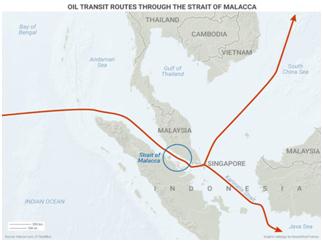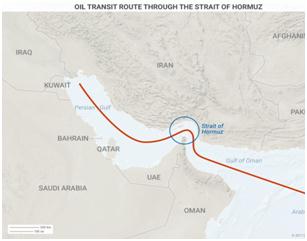‘What does energy security mean for Maldives?’
-
Being one of the top energy importers, India understands the current ‘energy diplomacy’ and is investing in engaging potential future energy partners like Maldives and addressing its challenges.
-
Background
- Energy has, no doubt, become an essential strategic component of bilateral equations.
- This is because energy security is not only a crucial foreign policy goal, but is tied inextricably to a nation’s larger security concerns.
- As India and Maldives look to become energy partners, it is important to consider the specific ways in which they can address each other’s energy challenges.
- It is further useful for India to understand energy security from the specific point of view of a small island nation.
-
Analysis
Understanding the concept of ‘Energy Security’
- Energy security refers to the ability to ensure the reliability of energy supply flows at stable and affordable prices.
- The goal is to mitigate risk, whether geopolitical, environmental, on the supply side, or to do with price stability.
- There are many dimensions to a country’s desire for energy security, depending on where it sits on a world map, what stage of development its economy is at and whether it’s a supplier or a consumer of energy.
- Demographics, size, material capabilities, availability of energy resources, technical expertise, human resource development and several other attributes, further add layers of complexity to the challenge of energy security.
-
Why energy diplomacy has take centre stage?
- Rise in demand: The world is witnessing a burgeoning demand for energy in the years to come, along with reserves of conventional fossil fuel becoming critically depleted.
- Increased competition: There will be increased competition for energy resources underpinned by other forms of competition and rivalry between nations, particularly the great powers.
- Interlinked nature: Energy diplomacy will become interlinked with other kinds of diplomacy pertaining to trade, environment and development assistance.
-
What are the chokepoints in this direction?
- Disruption to supply lines: Considering that much of the world continues to depend on fossil fuels, there is a strong maritime component to energy security. Disruptions to supply lines occur for various reasons such as:
- piracy or natural disasters
- extreme weather conditions like tsunamis and floods
- global pandemics
- Spike in prices: These delays lead to higher shipping costs and an invariable spike in prices, whether directly or indirectly.
- Geopolitical tensions: However, geopolitical tensions are what make nation states most wary. Supply routes are particularly vulnerable to chokepoints that can be easily blockaded in times of crisis, such as the Malacca Straits, Sunda Strait, Lombok Strait and Straits of Hormuz, amongst others.
- Disruption to supply lines: Considering that much of the world continues to depend on fossil fuels, there is a strong maritime component to energy security. Disruptions to supply lines occur for various reasons such as:
-
What are Maldives’s energy challenges?
- Reliance on imports: Overdependence on imports is a vulnerability from the point of view of energy security. Maldives has no proven fossil fuel reserves, i.e., oil or gas, so its energy needs are almost entirely met by imports.
- Energy storage: An alternative to mitigating the vulnerabilities associated with imports is to have better energy storage. This must be addressed across all energy types:
- For solar power, it would be batteries, but the challenge here is that they are prohibitively expensive
- For oil, developing a reserve stock is an option.
- Environmental challenges: Nation states face a two-part challenge, how to meet the short-term challenge of providing their populations with energy services while addressing the long-term goal of a zero-carbon economy. Energy goals cannot be addressed one after the other, such as energy access first and climate change later.
- For India, as it addresses the many dimensions of its energy security goals, its biggest challenge will be addressing the presence of coal in its energy mix.
- Human resource development: Another challenge that needs to be addressed in the Maldives is one of human resource development.
- Inequality challenge: There is a larger challenge of inequality, which need to be addressed both in the Maldives as well as in India. Disparities exist in terms of affordability, availability and quality of services. There is an urban rural divide when it comes to energy security in both countries as also a strong urban bias.
-
Why helping Maldives is important for India?
- The Strait of Hormuz and the Strait of Malacca are the world’s most important strategic chokepoints by volume of oil transit.
- The Maldives is geographically positioned like a ‘toll gate’ between the western Indian Ocean chokepoints of the Gulf of Aden and the Strait of Hormuz on the one hand, and the eastern Indian Ocean chokepoint of the Strait of Malacca on the other.
- Since the Indian Ocean itself is a key highway for global energy and trade flows, the importance of Maldives for international sea lanes of communication is vital.
- Thus, while the International Shipping Lanes (ISLs) in the vicinity of the Maldives have broad strategic significance for global maritime trade, they are of particular importance to India.
- Fifty per cent of India’s external trade and eighty per cent of its energy imports transit these ISLs
- Helping to address Maldives’ energy concerns is a step in the right direction for India’s own goals of energy security.
Quick facts about Maldives
- The Republic of the Maldives is located in the Indian Ocean.
- It is an archipelago comprising approximately 1,200 islands with a geographical spread over 90,000 sq.km.
- Incorporating some 26 atolls, the Maldives is one of the world’s most geographically dispersed countries, and is a 99 per cent water-nation.
- Maldives is the lowest-lying country on the planet. With the highest elevation being just 2.3 metres (7 feet 7 inches) above sea level, the archipelago has the world’s lowest naturally-occurring ‘highest-point’.
-
Conclusion
Energy is vital to how our economies and societies function. Therefore, the approach to energy security has to be an integrated one.



